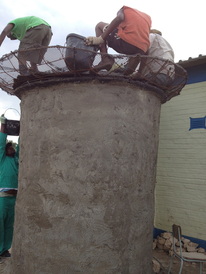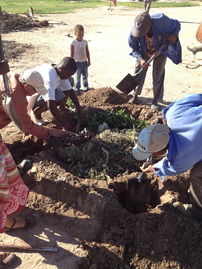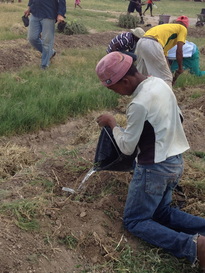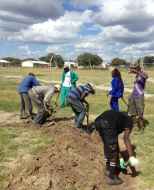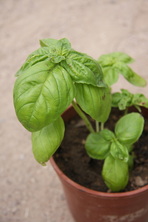Vergenoeg Permaculture Project
|
Vergenoeg means far enough in Afrikaans. The village got its name because it is where a group of San or Kalahari Bushmen were settled after cattle farming and colonial land ownership laws made their traditional hunter-gatherer lifestyle impossible to maintain. For Vergenoeg, this change in livelihood and culture has come to mean a chronic shortage of food due to dependency on deliveries of maize meal and diesel to pump water from bore holes. |
|
Background - Birth of a project
Seven years ago a group of international volunteers started to help the village by supplementing their food supply by buying maize meal. We quickly understood that it was simply a band-aid to the problem and actively sought a sustainable solution to the food shortage. After much research and time we found that Permaculture training and infastructure would be a truly sustainable solution.
Due to the whole-system thinking that is the basis of Permaculture, the food security project is also:
1. a water security project (rain water being caught in tanks and in the soil increases the sources of water available to both people and plants and reduces the dependency on having money for diesel to pump water from boreholes ),
2. a carbon capture project (planting trees and no tilling of soil),
3. a soil building project (mulching, recycling of nutrients and planting nitrogen-fixing trees),
4. a health project for children, mothers and fathers (growing varied diet of nutritional foods reduces malnutrition and medicinal plants are antibacterial antiviral and can contribute to overall health which creates stronger immune systems less venerable to infectious diseases. Also many of the herbal and medicinal plants help to meet the demands placed on a woman’s body during pregnancy and breastfeeding),
5. a sanitation project (use and treatment grey water in food producing systems and composting of human and animal wastes to reduce the places in which insects bread and spread disease),
6. a peace building project (Through permaculture instruction people learn to create systems in whatever space they are living that produces food often from resources that are currently being wasted. The consequence is greater access to food that is not dependant market food prices. As escalating food prices are a major contributing factor to social unrest a more resilient local food system not dependant global prices creates more resilient peaceful societies)
7. an education project (Growing food is one of the most basic skills that all people should have. Permaculture training gives people and children pattern literacy that teaches them not how to read books but how to read the environment and create systems to live in that are consistent with nature and land use patterns for long term sustainability)
8. an economic and community development project (vocational skills learned through permaculture training such as the building of Ferro-cement tanks give the people of Vergenoeg new employment and business opportunities and the training empowers the people of Vergenoeg to create a sustainable food producing system and the skills they need to effect change in their own community).read more
1. a water security project (rain water being caught in tanks and in the soil increases the sources of water available to both people and plants and reduces the dependency on having money for diesel to pump water from boreholes ),
2. a carbon capture project (planting trees and no tilling of soil),
3. a soil building project (mulching, recycling of nutrients and planting nitrogen-fixing trees),
4. a health project for children, mothers and fathers (growing varied diet of nutritional foods reduces malnutrition and medicinal plants are antibacterial antiviral and can contribute to overall health which creates stronger immune systems less venerable to infectious diseases. Also many of the herbal and medicinal plants help to meet the demands placed on a woman’s body during pregnancy and breastfeeding),
5. a sanitation project (use and treatment grey water in food producing systems and composting of human and animal wastes to reduce the places in which insects bread and spread disease),
6. a peace building project (Through permaculture instruction people learn to create systems in whatever space they are living that produces food often from resources that are currently being wasted. The consequence is greater access to food that is not dependant market food prices. As escalating food prices are a major contributing factor to social unrest a more resilient local food system not dependant global prices creates more resilient peaceful societies)
7. an education project (Growing food is one of the most basic skills that all people should have. Permaculture training gives people and children pattern literacy that teaches them not how to read books but how to read the environment and create systems to live in that are consistent with nature and land use patterns for long term sustainability)
8. an economic and community development project (vocational skills learned through permaculture training such as the building of Ferro-cement tanks give the people of Vergenoeg new employment and business opportunities and the training empowers the people of Vergenoeg to create a sustainable food producing system and the skills they need to effect change in their own community).read more
Project Elements
Polytechnic of Namibia |
The Faces of Vergenoeg
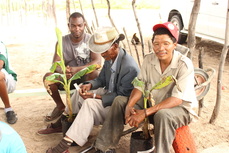
|
Thank You's!This project was made possible by the generosity of many individuals and organizations. Meet the project benefactors here. |
